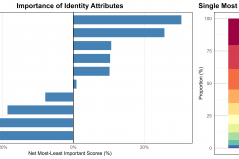Scrolling through the past: How digital tools change the way we remember

keywords:
autobiographical memory / AMEDIA model / digital media / digital age
Scrolling through the past: How digital tools change the way we remember
We are constantly documenting our lives with digital technologies. But how do these tools, from smartphone camera rolls to wearables and social media platforms, change what and how we remember? In this article, we explore the interplay between memories stored in our minds and the available technological devices. / more
Politics Doesn’t Define How Most People See Themselves
Politics Doesn’t Define How Most People See Themselves
The social groups to which we belong shape how we see ourselves, but which groups matter most? We show that political parties and ideology are not the first things that come to mind when people think about themselves. Instead, identities like nationality and age are far more central and may help bridge political divides. / more
Minority report: Fact or fiction? Can we actually predict violent behavior?

keywords:
violent behavior prediction / psychology of violence / crime prevention research / risk assessment / predictive technology
Minority report: Fact or fiction? Can we actually predict violent behavior?
More than twenty-four years ago, the film Minority Report offered a visionary glimpse into a future of self-driving cars, facial recognition, and the possibility of predicting crimes before they occur. Some of these technologies have since become reality, but how close are we really to predicting violent behavior? This article reflects on the science of predicting violent behavior, from past to present. / more
Between excellence and well-being: The case of academia

keywords:
Work-Life Balance; Mental Health / Productivity / Work Culture / stress
Between excellence and well-being: The case of academia
Loving your work can be both a privilege and a trap. In academia and beyond, passion and flexibility often turn into pressure and overwork. This article examines the hidden costs of excellence and offers ten science-based strategies to reclaim time, balance, and well-being. / more
Goal achieved? The role of sexual goals in influencing women’s perceptions and attitudes in sexually objectifying relationships

keywords:
sexual objectification / sexual goals / cost-benefit analysis / sexually objectifying interactions
Goal achieved? The role of sexual goals in influencing women’s perceptions and attitudes in sexually objectifying relationships
In this article, we demonstrate that perceived sexual objectification in interpersonal relationships can depend on factors such as the presence of sexual goals and how these goals are aligned between interaction partners. We present studies examining how the activation and alignment of sexual goals shape individuals’ cost-benefit evaluations and their subsequent intentions to continue the interaction. / more
Bisexual invisibility: Perceptions of bisexual people and their representation in the media

keywords:
bisexuality / media / invisibility / psychological well-being
Bisexual invisibility: Perceptions of bisexual people and their representation in the media
Bisexual people often remain “invisible” and are frequently targets of prejudice. This article explores the beliefs people have about bisexuality and examines the role of the media in either reinforcing negative stereotypes or promoting more positive representations. / more
Reality check: Call for abstracts for a special issue on clinical psychology and psychotherapy
Reality check: Call for abstracts for a special issue on clinical psychology and psychotherapy
This special issue Reality Check: What clinical science really tells us about promoting mental health aims to provide brief review articles on current developments in clinical psychology and psychotherapy research, presented in such a way that they are interesting and accessible to a wide readership of non-psychologists. / more
Diagnosed by AI – What our social media behavior reveals about our mental health

keywords:
mental health / social media / artificial intelligence / eating disorder / depression
Diagnosed by AI – What our social media behavior reveals about our mental health
When mental illnesses are detected early and treated promptly, people affected tend to suffer less and have a better chance of recovery. Until now, identifying signs of mental illness in everyday life has required human expertise. Researchers are developing new approaches to automatically detect mental illness by using information from social media. But how well does this work, and what risks might this approach involve? / more
The unbearable heaviness of having an appearance: How society teaches us to judge our bodies

keywords:
body image / sociocultural influences / aesthetic surgery / social media / social media literacy
The unbearable heaviness of having an appearance: How society teaches us to judge our bodies
Why do so many of us, especially women, struggle to feel comfortable in our own bodies? This article explores how sociocultural pressures and social media shape body dissatisfaction and drive interest in cosmetic surgery. It also offers evidence-based strategies to build a healthier, more compassionate relationship with your body. / more
Why Christmas (feels like it) comes faster each year

keywords:
Christmas / time perception / Ramadan
Why Christmas (feels like it) comes faster each year
Christmas is just around the corner, and with it comes that familiar sense that time is speeding up. Do you feel the same way? In this blog post, you’ll learn why this might be the case. / more


